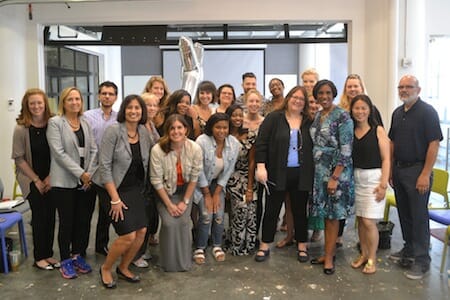When Startups Take on Gender Inequality, Women and Girls Win
This post is by Ayesha Khanna, founder and president of the Points of Light Civic Accelerator, which works with impact entrepreneurs to scale their social innovations; Joy Anderson, founder and president of the Criterion Institute, which approaches social change by intentionally changing markets; and Teresa Younger, CEO of the Ms. Foundation for Women, which is devoted to securing rights, equality and justice for women.
 The Points of Light Civic Accelerator convened social ventures helping women and girls succeed.
The Points of Light Civic Accelerator convened social ventures helping women and girls succeed.It has been a great summer for women and families in the U.S. The Women’s National Team won the 2015 Women’s World Cup. There is a serious female contender for president. And our Supreme Court ruled to legalize same-sex marriage in all 50 states and uphold the Affordable Care Act, opening up access to health insurance for many.
Despite recent gains, gender inequality is still alive and well. Women are only earning 75 percent what men earn, with a more significant gap for working women of color. Women also represent a small percentage of executive officers (14.6 percent) and Fortune 500 CEOs (4.6 percent).
With that backdrop, the Points of Light Civic Accelerator last spring convened 13 cutting-edge social ventures from across the country, all focused on helping women and girls fully participate and succeed in our global economy.
The accelerator is a 12-week boot camp for nonprofit and for-profit startups; through a series of in-person sessions and a rigorous online curriculum, participants learn from leaders – in business and community, design thinking and startup engineering – and from each other.
 Points of Light Civic Accelerator participants and advisers gather at the Centre for Social Innovation in New York during the spring session.
Points of Light Civic Accelerator participants and advisers gather at the Centre for Social Innovation in New York during the spring session.The Civic Accelerator’s most recent participants – the sixth group to run through the program – show how this innovative program is targeting key issues, to achieve deeper and more systemic insights and solutions.
These civic ventures are getting results in STEM (science, technology, engineering and math) education and workforce development, online harassment, and women and girls’ leadership in the U.S. and abroad. The solutions developed by these social entrepreneurs are inclusive and attempt to disrupt traditional systems that prevent women from reaching economic parity.
We had terrific guest faculty join us for the spring session, including Criterion Institute founder and president Joy Anderson and Ms. Foundation for Women president and CEO Teresa C. Younger.
We touched on many topics ranging from the intersections of gender, power and race to how the work of these startups fits within the context of gender equality writ large. Below are some of our shared reflections and insights from this dialogue.
Gender Lens – Beyond Women and Girls
When it comes to women and girls, our efforts to address gender inequity tend to focus on the individual – solutions to improve skills, opportunities and access. However, all genders need to be engaged to address the power dynamic and systems change required to build a truly inclusive society that takes advantage of everyone’s talents and contributions.
The Civic Accelerator’s recent participants were focused on building inclusive and innovative models that attempt to influence and change biased systems and markets to allow women and girls to more readily and successfully participate and succeed.
As we discussed how to define success at various levels – venture, organization and system-wide – we noticed the tendency to do a relatively simple count of women and girls (the number of girls in STEM programs or women leaders, for example) as primary indicators of progress.
While important, this approach limits our ability to interpret the complexity of the systems at play and does not reflect the fact that gender is a dynamic concept that defines norms, behaviors and identities that may be valued in a culture (or not).
The Role of Power
Leaders, including these venture founders, can use their power, networks and knowledge to create more access and equity. Influential leaders who are personally committed to speaking up and making decisions – who put themselves and their credibility on the line to create more equitable policies and practices – are what it takes to change an organization and the broader culture.
Proactively inviting diverse and opposing individuals and organizations to participate in a process, rather than attempting to join a process where they are excluded – the power of invitation – was a strategy we shared with the entrepreneurs.
Understanding perceptions of status and influence matters when you are fighting for access to capital and customers yourself. Systems change leaders have a double burden, as they need to think about what their ventures need, but also place those needs in the context of broader systems of power they are seeking to change.
This process requires constant navigation, as these leaders think about building non-traditional relationships and aligning with power brokers, in ways that move the system change forward. It is this larger change that is necessary for these ventures to ultimately scale.
This situation applies to women today who are juggling work, family demands and life, as they think about their roles in the broader movement. Women are disproportionately responsible for caregiving, even when employed outside of the home.
That means that when we work on workplace issues, we have to consider the realities of women’s lives – especially low-wage and immigrant women and women of color. For instance, access to affordable, quality childcare is essential for women’s economic empowerment. Likewise, workplace safety must also include measures to protect women from domestic violence, as nearly a third of women killed in U.S. workplaces between 2003-2008 were killed by a current or former intimate partner.
Enterprise vs. System Change
There is a difference between investing in individual ventures that are addressing issues impacting women and girls, and changing the underlying systems as a whole. Founders who are launching ventures that are creating new markets, like the ones supported by the Civic Accelerator, have unique challenges as they attempt to build their ventures.
The notion that a startup can, on its own, get to the root cause of a social problem and solve it in isolation is wrong. Twitter and Airbnb took advantage of emerging market trends, but they did not create the markets themselves.
Broad system reform requires consumer and citizen education and behavior changes, institutional shifts, and new policies that can be decades in the making. Startup founders disrupting social norms are tapping into change agents and emerging customer demand.
These disruptive ventures are betting on the change to come and it will require cross-sector intermediaries, larger institutions and governments working together to create strategies that shift the bigger system.
While this innovative class of change makers is creating a brighter future for women and girls, we know we need to do a lot more to build ecosystems that are not only supporting their success, but also focus on changing the systems that keep equality out of reach for women around the world.